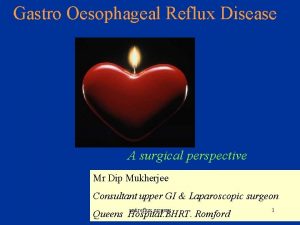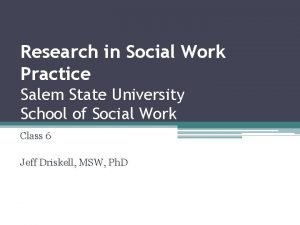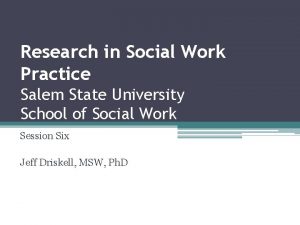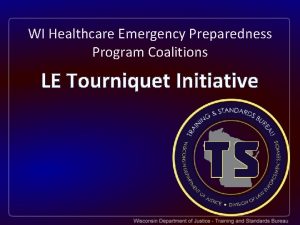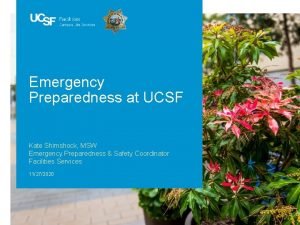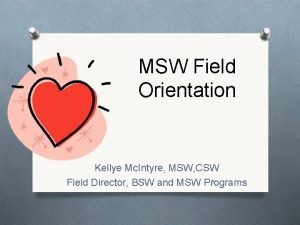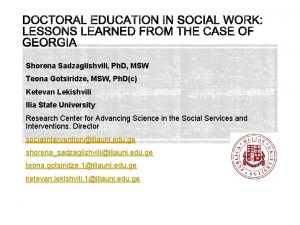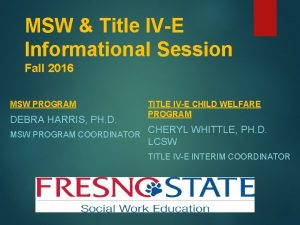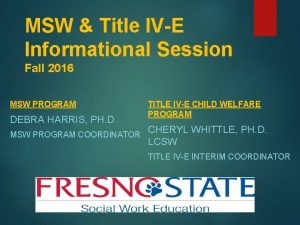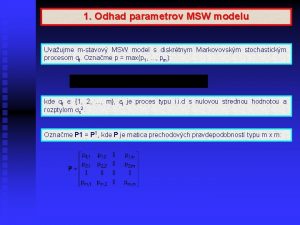What Matters What Really Matters Cherie Warriner MSW












- Slides: 12

What Matters What Really Matters Cherie Warriner, MSW, LCSW

Introduction Cherie Warriner, MSW, LCSW is a Clinical Social Worker with The Center for Healthy Aging. She specializes in providing counseling to older adults coping with significant life changes, challenges and loss. While employed with The Center for Healthy Aging she has assisted with the development and implementation of a Dementia Education Series for caregivers and participated in Ascension’s development and scale-up of the Institute for Healthcare Improvement’s Age-Friendly Health Systems initiative. Cherie earned her Bachelor of Social Work from Ball State University in 1991 and Master of Social work from Indiana University School of Social Work in 1995. She spent most of her career serving individuals who have had complex health issues in various settings. 2

Disclosure This speaker has no conflict of interest to disclose. 3

What Matters The four essential elements of an Age-Friendly Health System are known as the 4 Ms Framework for Age-Friendly Care: What Matters: Know and align care with each older adult's specific health outcome goals and care preferences including, but not limited to end-of-life care, and across settings of care. Medication: If medication is necessary, use Age-Friendly medications that do not interfere with What Matters, Mobility, or Mentation on across settings of care. Mentation: Prevent, identify, treat, and manage dementia, depression, and delirium across care settings. Mobility: Ensure that older adults move safely every day in order to maintain function and do What Matters. 4

Who Matters Physician NP Nursing Staff Social Worker Everyon e Case Office Staff 5 Physical Occupational Speech Therapist Manage r

How Matters Advance Directives • Healthcare Representative • Living Will • POST • Power of Attorney • Out of Hospital DNR Ask “What Matters? ” not “What’s the Matter” • What are your healthcare goals? • What makes life worth living? • What would make tomorrow a really great day for you? • What concerns you most when you think about your health in the future? • What is important to you at this stage in your life? • What brings meaning and purpose to your life? • Is there something you’d like to do or accomplish but you feel your health prevents you from doing it? 6 How you ask is not as important as that you ask.

When Matters Age Prognosis 7 • Average life expectancy for those without Multiple Chronic Conditions • Age 65: 19 years • Age 75: 10 years • Age 85: 6. 6 years • Where is your patient in the disease process • As prognosis and function changes, so may the individual’s goals

Why Matters Asking What Matters: • Enhances patient centered care and allows clinicians to look at the person as a whole; not just their disease process (Person-in-environment) • Improves a clinician’s ability to assess the social determinants of healthcare (transportation, access to medication, basic needs, etc. ) • Increases the patient’s engagement in the treatment plan • Increased adherence 8

Why Matters—continued • Allows clinicians to assess insight and a transition into more difficult conversations about prognosis—”the palliative care dance” • Improves patient satisfaction • Lowers inpatient utilization (↓ 54%) and ICU stays (↓ 80%), increases hospice use by 47. 2%, and improves patient satisfaction (Agency for Healthcare Research and Quality (AHRQ 2013) 9

What Matters Makes a Difference 10

“You treat a disease, you win, you lose. You treat a person, I guarantee you, you’ll win, no matter what the outcome. ” -Hunter “Patch” Adams 11

References Age-Friendly Health Systems: The 4 Ms | Consult. Geri Assessment Tool. (2018, November 02). Retrieved from https: //consultgeri. org/try-this/general-assessment/issue-35 Lum, M. , & Lum, M. (2018, May 30). Has Your Doctor Asked What Really Matters To You? – Star 2. com. Retrieved from https: //www. star 2. com/health/2018/05/30/has-your-doctor-asked-what-really-matters-toyou/ Why is it important to ask 'what matters? ' (n. d. ). Retrieved from https: //www. whatmatterstoyou. scot/whyis-it-important-to-ask-what-matters/ Overview. (n. d. ). Retrieved from http: //www. ihi. org/Engage/Initiatives/Age-Friendly-Health. Systems/Pages/default. aspx Social Security. (n. d. ). Retrieved from https: //www. ssa. gov/oact/STATS/table 4 c 6. html 12



